高考英语过去分词讲解课件
合集下载
高中英语语法过去分词的用法(30张)ppt课件

to be produced B. produced C. being produced D. having produced
;
区别
①过去分词做定语:表被动,表完成。 ②如今分词作定语:表自动,表进展。 ③不定式作定语:表示将要发生的动作。
;
2. 过去分词作表语
位于系动词后,不表示“被动〞或“完成〞, 而表示主语的形状或心情,相当于描画词。
(encourage).
• We were __e_n__c_o_u_r_a_g_e_d__ (encourage )at
what he said.
• The football game is very _b_o_r_i_n_g__(bore). • We were _b_o_r_e_d__(bore) at the football
“觉得类〞: feel, sound, smell, taste “变成类〞:become, go, get, grow, fall, turn “依然类〞:remain, stay, keep
;
V-ing 与V-ed 作表语的区别
• What he said was e_n__c_o_u_r_a_g_i_ng
south foot of the mountain is a sea of
trees.
〔陕西2021〕
A. Seen
B. Seeing
C. Having seen
D. To see
;
2. ______ twice, the postman refused to
deliver our letters unless we chained
the time. 4. 2.带有“致使〞含义的动词: have, make 5. 〔1〕留意〞have sth done〞的两种用法: 6. ①表示让某人做某事,如: 7. I have had my bike repaired . 8. The villagers had man;y trees planted just then.
;
区别
①过去分词做定语:表被动,表完成。 ②如今分词作定语:表自动,表进展。 ③不定式作定语:表示将要发生的动作。
;
2. 过去分词作表语
位于系动词后,不表示“被动〞或“完成〞, 而表示主语的形状或心情,相当于描画词。
(encourage).
• We were __e_n__c_o_u_r_a_g_e_d__ (encourage )at
what he said.
• The football game is very _b_o_r_i_n_g__(bore). • We were _b_o_r_e_d__(bore) at the football
“觉得类〞: feel, sound, smell, taste “变成类〞:become, go, get, grow, fall, turn “依然类〞:remain, stay, keep
;
V-ing 与V-ed 作表语的区别
• What he said was e_n__c_o_u_r_a_g_i_ng
south foot of the mountain is a sea of
trees.
〔陕西2021〕
A. Seen
B. Seeing
C. Having seen
D. To see
;
2. ______ twice, the postman refused to
deliver our letters unless we chained
the time. 4. 2.带有“致使〞含义的动词: have, make 5. 〔1〕留意〞have sth done〞的两种用法: 6. ①表示让某人做某事,如: 7. I have had my bike repaired . 8. The villagers had man;y trees planted just then.
高中英语 过去分词的用法全面(共46张ppt)
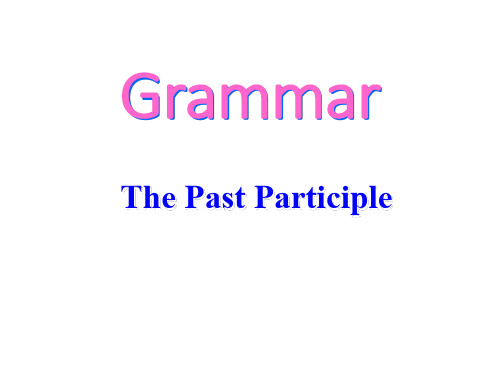
quite importanBiblioteka e. being discussed
to be discussed
注:ing分词作定语有时意义不同:
flying fish 飞鱼 a running dog 走狗 a falling tide 落潮 a crying boy 哭着的孩子
a running machine a swimming pool a waiting room a walking stick a fishing pole a reading room
eg: surprised/ surprising; encouraged/ encouraging; moved/ moving...
二、作定语 (attribute)
1. 前置定语:单个的v-ed作定语,一般放在 被修饰的n.之前; 后置定语:v-ed短语作定语时,常被放在被 修饰的n.之后,相当于一个定语从句。 eg: an invited guest 一位受到邀请的客人
eg: The cup is broken. 系表结构表状态
The cup was broken by Tom. 被动语态表动作
注意比较:
3. 过去分词v-ed和v-ing作表语的区别:
过去分词v-ed: 表主语(人)所处的心理状态, 个人的感受. “(人)感到...”
现在分词v-ing: 表主语(物或人)所具有的特征. “(物或人)令人...”
eg: The letter posted today will reach you in a week. =
The letter which was posted today will...
(2) 若是vi.的过去分词作定语只表示动作的完 成,不表被动,可改成v.用完成时态的定语 从句。
to be discussed
注:ing分词作定语有时意义不同:
flying fish 飞鱼 a running dog 走狗 a falling tide 落潮 a crying boy 哭着的孩子
a running machine a swimming pool a waiting room a walking stick a fishing pole a reading room
eg: surprised/ surprising; encouraged/ encouraging; moved/ moving...
二、作定语 (attribute)
1. 前置定语:单个的v-ed作定语,一般放在 被修饰的n.之前; 后置定语:v-ed短语作定语时,常被放在被 修饰的n.之后,相当于一个定语从句。 eg: an invited guest 一位受到邀请的客人
eg: The cup is broken. 系表结构表状态
The cup was broken by Tom. 被动语态表动作
注意比较:
3. 过去分词v-ed和v-ing作表语的区别:
过去分词v-ed: 表主语(人)所处的心理状态, 个人的感受. “(人)感到...”
现在分词v-ing: 表主语(物或人)所具有的特征. “(物或人)令人...”
eg: The letter posted today will reach you in a week. =
The letter which was posted today will...
(2) 若是vi.的过去分词作定语只表示动作的完 成,不表被动,可改成v.用完成时态的定语 从句。
过去分词讲解公开课完整PPT课件
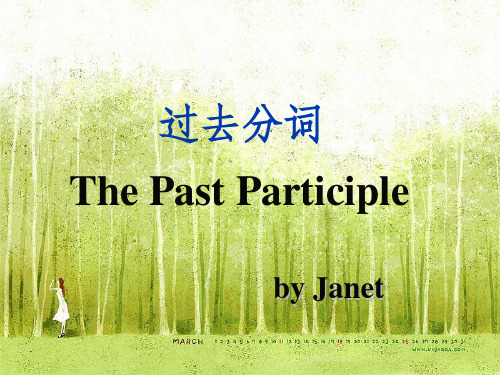
1. A. Nobody was _i_n_t_e_r_e_st_e_d_ in the story
2.
he told.
B. The story he told was very _i_n_t_e_re_s_t_i_n_g_.
(interested, interesting )
2. A. Everybody was _e_x_c_i_t_e_d_ to hear the news. B. The news is very _e_x_c_i_ti_n_g___ indeed.
I saw him _b_it_t_e_n_b_y__a_d_o_g_______. I saw the dog _b__i_t_i_n_g__h__i_m_______.
.
四、 4 pp与 be+pp分词作宾补的区别
We have an English teacher _c_a_ll_ed____ (call) Janet. We have an English teacher who _w_a_s_ca_l_le_d_(call)
talked about .
定语
2. Many used cars will be sold in this market. 定语
3. He became interested in two theories. 表语 4. She looked worried. 表语 5. She found her necklace gone on her way home宾. 补
接现在分词时,表示动作正在发生或进行,或正要做分词表 示的动作;
接过去分词时,表被动或完成。
.
scold
I saw him _s_c_o_l_d_e_d_b_y__h_is__m_o_t_h_e_r. I saw his mother _s_c_o_ld_i_n_g_h_i_m_______.
高中英语-过去分词ppt课件
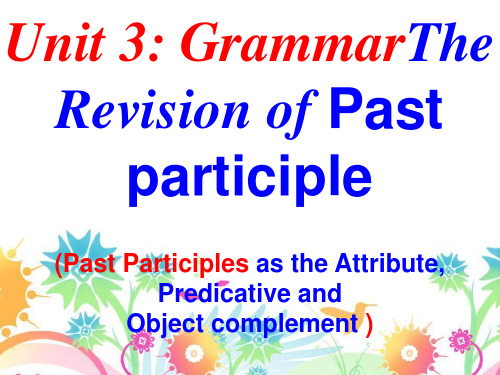
.
8
The _li_g_h_te_d_ match was burning
brightly and she seemed very
_d_e_li_gh_t_e_d_.
.
9
The next day, people saw the
girl ___fr_o_z_e_n_t_o__d_e_a_th___. What
*She saw a Christmas tree decorated with many gifts . ——She saw a Christmas tree which was decorated with many gifts.
.
14
【高考链接】
(2014·重庆高考) The producer comes regularly to collect the cameras r_e_t_u_r_n_e(dreturn) to our shop for
very _d_e_lig_h_te_d___.
The next day, people saw the girl __f_ro_z_en_t_o_d_ea_th___. What a
poor girl !
.
11
Round 3 自学成才
Observe and summarize by yourself
She was so cold that she sat in a corner with her legs _h_u_d_d_le_d__up.
.
7
She lit a match and saw a
Christmas tree _d_e_c_o_ra_t_e_d with
many gifts.
过去分词课件PPT课件
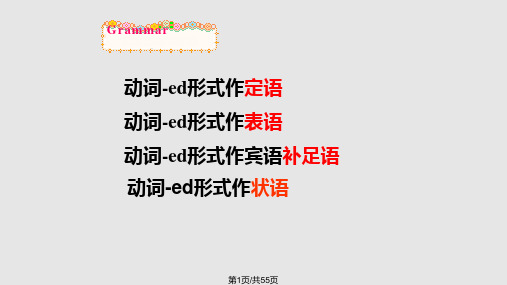
Grammar
动词-ed形式作定语 动词-ed形式作表语 动词-ed形式作宾语补足语 动词-ed形式作状语
第1页/共55页
一、动词-ed形式作定语
过去分词作定语往往与被修饰的词靠得很 紧, 渐渐地成为一个复合词。这种分词叫分词
形容词 (the Participle Adjective), 实际上相当
动词的-ed形式可以在“主语+谓语+宾 语+宾语补足语”句型中充当宾语补足语。 在这一结构中, 动词-ed形式和它前面的宾 语构成逻辑上的被动关系。如果这种句子 改为被动语态,原来的宾语补足语变成了主 语补足语。
第17页/共55页
People found the girl beaten black and blue. 人们发现这个女孩被打得青一块紫一块。 (宾语补足语) The girl was found beaten black and blue. (主语补足语)
He grew much tired of the work.
他十分厌倦这工作。
He seemed quite delighted at the idea.
听了这想法他似乎很高兴。 第12页/共55页
高考题
1) Cleaning women in big cities usually get
____ by the hour. (NMET98)
I have never heard him spoken ill of others.
我从未听过有人说他的坏话。
She felt a great weight taken off her mind.
她觉得心里轻松了些。
They considered the matter settled.
动词-ed形式作定语 动词-ed形式作表语 动词-ed形式作宾语补足语 动词-ed形式作状语
第1页/共55页
一、动词-ed形式作定语
过去分词作定语往往与被修饰的词靠得很 紧, 渐渐地成为一个复合词。这种分词叫分词
形容词 (the Participle Adjective), 实际上相当
动词的-ed形式可以在“主语+谓语+宾 语+宾语补足语”句型中充当宾语补足语。 在这一结构中, 动词-ed形式和它前面的宾 语构成逻辑上的被动关系。如果这种句子 改为被动语态,原来的宾语补足语变成了主 语补足语。
第17页/共55页
People found the girl beaten black and blue. 人们发现这个女孩被打得青一块紫一块。 (宾语补足语) The girl was found beaten black and blue. (主语补足语)
He grew much tired of the work.
他十分厌倦这工作。
He seemed quite delighted at the idea.
听了这想法他似乎很高兴。 第12页/共55页
高考题
1) Cleaning women in big cities usually get
____ by the hour. (NMET98)
I have never heard him spoken ill of others.
我从未听过有人说他的坏话。
She felt a great weight taken off her mind.
她觉得心里轻松了些。
They considered the matter settled.
高中英语过去分词的用法课件(共53张PPT)

– Can those ____ at the
back of the classroom
hear me?
A. seat
B. sit
C. seated D. sat
35、___ in the queue for half an hour, the man suddenly realized he had left the money in the car. A. Waiting B. To wait C. Having Waited D. To have waited
非谓语动词的用法讲解:
过去分词的用法
过去分词作定语
作定语用的过去分词相当于形容词,表被动或表完成
1. 过去分词用作定语,如果是单个词语,常置于其所修 饰的名词之前。
The injured workers are now being taken care of in the hospital.
2.过去分词用作定语,如果是短语,一般置于其所修饰的 名词之后,其意义相当于一个定语从句。
The two theories were interesting. The news were disappointing. The result of the exam is delighting. What he does is satisfying.
• They were __s_u_rp__ri_s_e_d__ at the news.(惊奇于)
因为写得匆忙,这篇文章不是很好。
值得注意的是,有些过去分词作状语时不表 被动而表主动。这样的过去分词及短语常见 的有:
lost ( 迷 路 ) ; seated ( 坐 ) ; hidden ( 躲 ) ; stationed ( 驻 扎 ) ; lost / absorbed in ( 沉 溺 于 ) ; born (出身于); dressed in (穿着); tired of (厌烦)。
《过去分词的用法》PPT课件
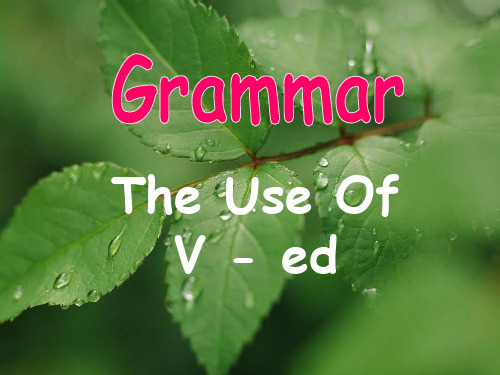
--精品--
1. Past Participle used as attribute
The ground is covered by __fa__ll_e_n___
(fall) leaves.
--精品--
These __w__a_n_t_e_d__ (want) people
are from Hong Kong.
--精品--
Translation
1. 我有些话要说。 I have some words to say. 2. 昨天我理了发。 I had my hair cut yesterday.
--精品--
3. 我叫弟弟寄了一封信。 I had my brother post a letter.
4. 别让机器一直开着。 Don’t have the machine running.
The excited person--i精s品-R- onaldo.
作定语
单词分词+被修饰的词 被修饰的词+分词短语
1、现在分词作定语,当分词单独做定语时,放在所修饰 的名词前;如果是分词短语做定语放在名词后。
They found a damaged car at the gate of the park.
--精品--
2. Past Participle used as predicative
The shop is __c_l_o_s_e_d__(close).
--精品--
Cleaning women in big cities usually
get __p_a_i_d_ (pay) by the hour.
A. smoke B. smoking C. to smoke D.smoked
1. Past Participle used as attribute
The ground is covered by __fa__ll_e_n___
(fall) leaves.
--精品--
These __w__a_n_t_e_d__ (want) people
are from Hong Kong.
--精品--
Translation
1. 我有些话要说。 I have some words to say. 2. 昨天我理了发。 I had my hair cut yesterday.
--精品--
3. 我叫弟弟寄了一封信。 I had my brother post a letter.
4. 别让机器一直开着。 Don’t have the machine running.
The excited person--i精s品-R- onaldo.
作定语
单词分词+被修饰的词 被修饰的词+分词短语
1、现在分词作定语,当分词单独做定语时,放在所修饰 的名词前;如果是分词短语做定语放在名词后。
They found a damaged car at the gate of the park.
--精品--
2. Past Participle used as predicative
The shop is __c_l_o_s_e_d__(close).
--精品--
Cleaning women in big cities usually
get __p_a_i_d_ (pay) by the hour.
A. smoke B. smoking C. to smoke D.smoked
高考英语 过去分词复习公开课(共20张PPT)
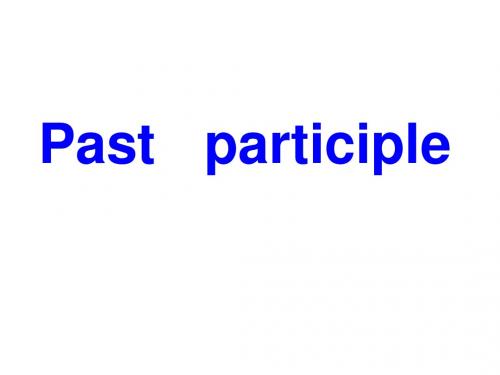
过*She saw a Christmas tree decorated with many gifts . ——She saw a Christmas tree which was decorated with many gifts.
She lit a match and saw a Christmas tree _d_e_c_o_ra_t_e_d with many gifts.
常见的系动词有be, become, seem , look, feel, smell, taste, sound , get, grow, turn , stay, remain
The _li_g_h_te_d_ match was burning brightly and she seemed very _d_e_li_gh_t_e_d _.
Task two: Comparison V-ing form VS V-ed form
1. I found my apple _e_a_te_n__ by a worm. 2. I found a worm _e_a_t_i_n_g_ my apple. (eat)
3. The blouse _w_a_s__h_e_d_ (wash) by the girl looks very clean. 4. The girl _w__a_s_h_i_n_g_ (wash) the blouse is very pretty.
It was snowing and very cold outside. A little girl was walking in the street,selling matches. She didn’t wear any shoes because she had her shoes lost. She looked very worried because there were lots of matches left. She wished all her matches sold but nobody bought a single one. She was so cold that she sat in a corner with her legs huddled up.
高考英语一轮复习——过去分词课件(共39张PPT)
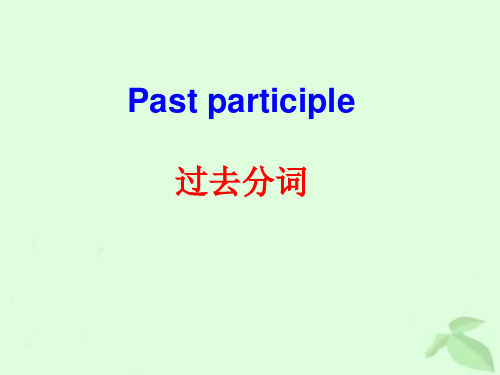
last night. • 3. The angry couple are trying to make
themselves heard.
Find out the rules: 过去分词紧跟在__宾__语__(谓语/宾语) 之后作宾__语__补__足__语__,用于补充完整 宾语的含义,过去分词与宾语存 在_被__动__(主动/被动)关系。
• (If it is) heated, water changes into steam. • 条件状语
• (Although he was) defeated again, he didn’t lose heart. 让步状语
• The professor went into the courtyard, (and he was) followed by his wife. 伴随状语
• The staff in the office are_e_x_c_it_e_d_.
办公室职员都 很兴奋。
• The engineer is_c_o_n_f_u_s_ed_.
这个工程师感
到很迷惑。
• The audience in the theater are__s_h_o_c_k_e_d_.
• 1. Seen from space, the earth looks like a big blue ball.
• 2. Moved by the film, he started crying. • 3. Heated, water changes into steam. • 4. Defeated again, he didn’t lose heart. • 5. The professor went into the
themselves heard.
Find out the rules: 过去分词紧跟在__宾__语__(谓语/宾语) 之后作宾__语__补__足__语__,用于补充完整 宾语的含义,过去分词与宾语存 在_被__动__(主动/被动)关系。
• (If it is) heated, water changes into steam. • 条件状语
• (Although he was) defeated again, he didn’t lose heart. 让步状语
• The professor went into the courtyard, (and he was) followed by his wife. 伴随状语
• The staff in the office are_e_x_c_it_e_d_.
办公室职员都 很兴奋。
• The engineer is_c_o_n_f_u_s_ed_.
这个工程师感
到很迷惑。
• The audience in the theater are__s_h_o_c_k_e_d_.
• 1. Seen from space, the earth looks like a big blue ball.
• 2. Moved by the film, he started crying. • 3. Heated, water changes into steam. • 4. Defeated again, he didn’t lose heart. • 5. The professor went into the
高考英语 过去分词课件

C. tired; bored D. tiring; boring
9.It is believed that if a book is ___,it will surely ___the reader.
A. interested; interest
B. interesting; be interested
(2) The boy looked up with a pleased expression. 男孩带着满意的表情举目而视。
过去分词作表语
过去分词作表语主要表示主语的心理感觉 或所处的状态。.
The cup is broken. 茶杯破了。 He looked worried after reading the letters. 看完信后,他显得很忧虑.
•1、纪律是集体的面貌,集体的声音,集体的动作,集体的表情,集体的信念。 •2、知之者不如好之者,好之者不如乐之者。 •3、反思自我时展示了勇气,自我反思是一切思想的源泉。 •4、在教师手里操着幼年人的命运,便操着民族和人类的命运。一年之计,莫如树谷;十年之计,莫如树木;终身之计,莫如树人。 •5、诚实比一切智谋更好,而且它是智谋的基本条件。 •6、做老师的只要有一次向学生撒谎撒漏了底,就可能使他的全部教育成果从此为之失败。2022年1月2022/1/102022/1/102022/1/101/10/2022 •7、凡为教者必期于达到不须教。对人以诚信,人不欺我;对事以诚信,事无不成。2022/1/102022/1/10January 10, 2022 •8、教育者,非为已往,非为现在,而专为将来。2022/1/102022/1/102022/1/102022/1/10
7. The door remained _____.
- 1、下载文档前请自行甄别文档内容的完整性,平台不提供额外的编辑、内容补充、找答案等附加服务。
- 2、"仅部分预览"的文档,不可在线预览部分如存在完整性等问题,可反馈申请退款(可完整预览的文档不适用该条件!)。
- 3、如文档侵犯您的权益,请联系客服反馈,我们会尽快为您处理(人工客服工作时间:9:00-18:30)。
fallen leaves
returned students
a grown-up daughter a broken heart
a respected leader a recently-built house
三.功能
1.At that time, such thing was a forbidden topic to be
6. He is gong to have the room painted.
宾补
高 考 英 语 过 去分词 讲解课 件(共3 5张PPT )
现在分词: 表示动作是主动的和正在进行 过去分词: 表示动作是被动的和完成
现在分词 形式
过去分词 形式
一般式
doing
done
完成式 (主)having done (被)having been done
e.g. We saw the thief caught by the police.
People found the water polluted.
Have you heard a pop song sung in Japanese?
1. 过去分词作表语,表示主语所处的状态, 其逻辑主语就是句子的主语。
The window is broken. The inner gate was locked. She was greatly excited.
2. 与现在分词作表语的区别。 现在分词:主语的特征或性质,“令人…”,有主动意 思。
e.g. How disappointing the election is!
过去分词:主语的感受,“感到…”,有被动意思。
e.g. They feel disappointed at the election.
高 考 英 语 过 去分词 讲解课 件(共3 5张PPT )
高 考 英 语 过 去分词 讲解课 件(共3 5张PPT )
e.g. I want the work (to be) finished by Sunday. Jim ordered the room (to be) cleaned.
2. 表“感觉, 心理状态”的动词: see, hear, find, feel, think, watch, notice + object(宾语) + p.p.
=The book, which was written in 1957, tells the struggle of the miners.
注:The problem (discussed yesterday) has something to do with daily life. (表示完成)
2.作用---相当于一个定语从句 (1)Is there anything planned for tonight ?
=Is there anything that has been planned for (t2o)nigThhte?book, written in1957, tells the struggle of the miners.
talked about .
定语
2. Many used cars will be sold in this market. 定语
3. He became interested in two theories. 表语 4. She looked worried. 表语
5. She found her necklace gone on her way home宾. 补
分词在句中可以作表语、定语、宾语补足 语和状语。
高 考 英 语 过 去分词 讲解课 件(共3 5张PPT )
高 考 英 语 过 去分词 讲解课 件(共3 5张PPT )
I. Past participle used as attributes (定语)
1.位置: 单个分词位于名词前,短语则在名词后, 被过去分词所修饰的名词,就是该分词的逻辑 主语。
The stolen car was found by the police last week. The speaker answered all the questions raised by the audience.
高 考 英 语 过 去分词 讲解课 件(共3 5张PPT )
高 考 英 语 过 去分词 讲解课 件(共3 5张PPT )
The problem (being discussed now) has nothing to do with daily life. (表示正在进行)
高 考 英 语 过 去分词 讲解课 件(共3 5张PPT )
高 考 英 语 过 去分词 讲解课 件(共3 5张PPT )
II. Past participles used as predictive(表语)
常见的这类此有: interesting — interested encouraging — encouraged delighting—delighted disappointing—disappointed pleasing—pleased puzzling—puzzled satisfying—satisfied surprising—surprised worrying--worried
过去分词 The Past Participle
1 构成 2 含义 过去分词 3 功能 4 区别 5 练习
一构成: v +ed 或不规则的变化动词 例如: want---wanted---wanted
do---did---done
go---went---gone
二过去分词本身的含Байду номын сангаас: 被动或完成
高 考 英 语 过 去分词 讲解课 件(共3 5张PPT )
III. Past participle used as the Object
Complement (宾语补足语)
1. 表“希望,要求”的动词: want, wish, expect, wish, like, order + (to be) done 表示“希望/要求某人或某事被…”
